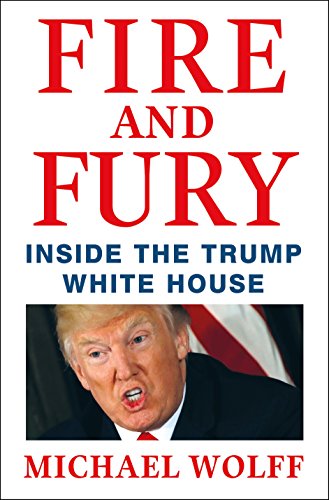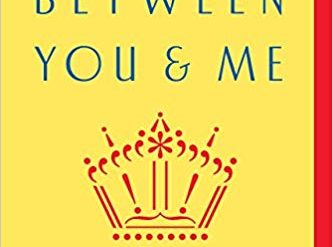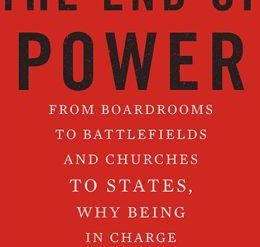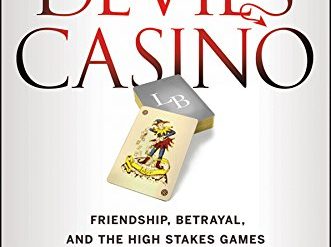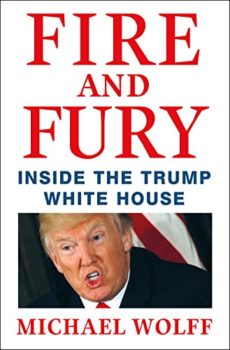
If you deplore Donald Trump’s racism, misogyny, meanness, stupidity, narcissism, and recklessness, and the sheer incompetence of his White House, as I do, and if there is a malicious streak in you, as there is in me, you may love Michael Wolff’s Fire and Fury. It’s difficult to imagine any account of the goings-on in Donald Trump’s White House that would paint a darker picture of this worst of all Presidents and the servile minions around him. Fire and Fury is scathing.
Estimated reading time: 6 minutes
Other reviewers have panned this book
However, far better writers than I have reviewed this book and found it wanting. Here, for example, is Masha Gessen writing in The New Yorker (January 7, 2008): “The President of the United States is a deranged liar who surrounds himself with sycophants. He is also functionally illiterate and intellectually unsound. He is manifestly unfit for the job. Who knew? Everybody did. So why has a poorly written book containing this information, padded with much tedious detail, become an overnight sensation, a runaway best-seller, and the topic of every other political column, podcast, and dinner conversation? It seems we are in bigger trouble with reality perception than we might have realized . . . That ‘Fire and Fury’ can occupy so much of the public-conversation space degrades our sense of reality further, while creating the illusion of affirming it.”
Fire and Fury: Inside the Trump White House by Michael Wolff ★★★☆☆
In a similarly unflattering review in the San Francisco Chronicle (January 9, 2018), Book Review Editor John McMurtry describes Fire and Fury as “a few hundred pages of gossipy, anecdote-heavy accounts that paint a highly unfavorable portrait of a deeply unpopular president . . . Of course, as with any satisfying dish that has you craving more, the book, with all its accounts of petty and profanity-infused backstabbing, can ultimately leave you with the feeling of having consumed one too many of Trump’s beloved cheeseburgers.”
Despite the bad reporting, a terrible truth emerges
It’s difficult to disagree with any of this. Surely, Fire and Fury is a product of very bad reporting. But strip away the flimsy analysis, the nasty innuendo, the unattributed zingers, and the opinionated diatribe, and you’re left with an indictment of Donald Trump that is still likely to shock anyone who is not immersed 24 hours a day in the seething cauldron of political news. The picture that emerges from even a skeptical reading of Fire and Fury is horrific. Everything I had come to believe about Donald Trump has been confirmed: Our president is an impulsive man of limited intelligence, a racist, a sexual predator, a pathological liar, and an unrelenting narcissist who almost never listens and never accepts criticism.
What I learned from Fire and Fury
Still, I learned a few things from Fire and Fury:
- Donald Trump never wanted to be president, and he was stunned when he won. His campaign was a brand-building exercise—a way for him to make a lot more money. “He would come out of this campaign, Trump assured [former Fox News chairman Roger] Ailes, with a far more powerful brand and untold opportunities. ‘This is bigger than I ever dreamed of,’ he told Ailes in a conversation a week before the election. ‘I don’t think about losing because it isn’t losing. We’ve totally won.’”
- Practically everyone on the White House staff, including his daughter and son-in-law, treat Trump like a willful two-year-old. Almost nobody ever says no to him. Those rare occasions when anyone does so trigger tantrums and vicious backbiting from the president. He even badmouths his daughter and son-in-law.
All this may be old hat to you, if you obsessively follow the daily news. I don’t.
How did Michael Wolff ever get access?
I find it astonishing that anyone in a senior position in the White House, much less the president himself, would allow a man with Michael Wolff’s reputation as a scandal-monger to set foot in the place, let alone hang out with them for eighteen months. But Edward Helmore has an explanation (The Guardian, January 14, 2018): “After writing relatively positive profiles of Trump and Bannon for the Hollywood Reporter, Wolff joined the parade of job-seekers and ring-kissers at Trump Tower in the weeks after the astonishing election result.
“‘I said to the president, “I’d love to come down and be an observer at the White House.” That’s when he thought I was asking for a job. I said, “No, no. I might want to write a book.” His face fell. He was completely uninterested. So I pressed a little. I’d really like to do it. So it was, “Yah, yah. OK sure.”’”
What’s missing from Wolff’s reporting
One more thing about the book: in any serious effort at political analysis or reporting, it’s customary to include notes, usually extensive ones, about the sources of the author’s information. There are no notes in Fire and Fury. Nor does Wolff date the conversations he reports having had or learned about. This is exceedingly sloppy reporting.
And here’s a taste of how Wolff’s peers in journalism look at him. “It’s unsurprising that, as a former colleague delicately puts it, ‘people really can’t stand Michael.’” So wrote Michelle Cottle in the New Republic more than a decade ago (August 29, 2004). She continued: “What is surprising is how much of the animus seems unrelated to the content of his commentary. On a meta level, Wolff is resented for not playing by the rules of his chosen profession. He has a reputation for busting embargoes and burning sources by putting off-the-record comments on the record.”
About the author
From Wikipedia: “Michael Wolff is an American author, essayist, and journalist, and a regular columnist and contributor to USA Today, The Hollywood Reporter, and the UK edition of GQ. He has received two National Magazine Awards, a Mirror Award, and has authored seven books.” (Do you wonder how he managed to win those awards? I do.)
One of Wolff’s earlier books, Burn Rate, chronicled his effort in the 1990s to become a multimillionaire on the Internet. The book was panned by many reviewers, just as has been the case with Fire and Fury. And those reviews suggest there’s nothing new in Wolff’s style or approach to his subjects.
Here, for example, is Katie Hafner, writing about Burn Rate in the New York Times (July 26, 1998): “Wolff spares no feelings. He casts such an unforgiving eye on the people around him that his tone often smacks of vendetta. He depicts his cohorts as fakes and blowhards, arrogant and clueless. [And] he is locked in a hate-hate relationship with one of his main investors, who Wolff believes is out to double-cross him. Wolff portrays his partner as a wealthy, simpering venture capitalist wannabe, and makes disagreeable sport of deceiving him. It is this dark figure who eventually strips Wolff of control of his own company.”
For related reading
During the past year, I’ve reviewed several other books about Donald Trump and his unlikely rise to the presidency:
- One was Guardian reporter Luke Harding’s book, Collusion, along with the so-called Steele Dossier, which I posted at Collusion exposed, but is there more? Is Donald Trump a Russian agent?
- Another was Devil’s Bargain by Joshua Green, reviewed at How Steve Bannon sold the alt-right to Donald Trump and made history.
- I also reviewed Jonathan Allen and Amie Parnes’ revealing book, Shattered, about Why Hillary Clinton lost the 2016 election.
In fact, you’ll find this title listed as an after-thought on Top five books about Donald Trump and his impact on American democracy.
Like to read books about politics and current affairs? Check out Top 10 nonfiction books about politics.
And you can always find my most popular reviews, and the most recent ones, on the Home Page.

